SOM Students Create Online Tribute to Dean Mitchell
May 18th, 2020

Posted in GUMC Stories | Tagged 2019 Novel Coronavirus, coronavirus, COVID-19, School of Medicine, SOM Commencement 2020
(May 17, 2020) — It’s a highly unusual time to be graduating from medical school.
Just ask this year’s 187 graduates of Georgetown’s School of Medicine, who are making the transition from student to physician against the backdrop of a global pandemic.
For the Class of 2020, the sacrosanct rites of passage that typically form the bedrock of the final year of medical school have looked a bit different this year.
In the wake of COVID-19, they were pulled from their clinical rotations five weeks early per national guidelines, and many scattered to their hometowns to finish out the academic year.
Match Day, the highly anticipated event when fourth-year medical students nationwide learn where they will “match” for their residencies alongside classmates and families, was conducted online. And, rather than walking across the stage on graduation day of May 17 to accept their diplomas, and celebrating in-person with family and friends, this crop of graduates watched the ceremony on their computers, tablets, and phones.
Even under these strangest of circumstances, graduates have not lost sight of the reality that they soon will be on the front lines themselves and face their greatest test yet.
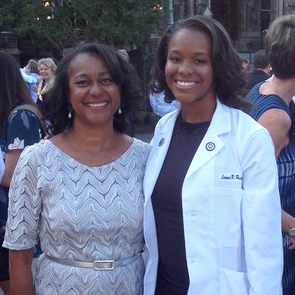
“This is truly an exceptional time to be entering the field of medicine,” said Leanna Rucker (M’20), who will begin her residency in internal medicine at MedStar Georgetown University Hospital in a few weeks.
“I always said I wanted to care for patients who are very sick, and it just so happens that my very first shift of residency will be in the [intensive care unit]. So on day one, I’ll be starting right there at the front line,” Rucker added.
While she feels ready, Rucker does not underestimate the challenges COVID-19 presents.
“I think the biggest change I have to prepare for is how to communicate with patients when they can’t have any visitors or family present. For any hospitalized patient, not just those with COVID-19, they are not going to have their loved ones at bedside, so we need to approach them with compassion and the understanding that they are probably feeling even more vulnerable during this time,” she said.
Prior to the Association of American Medical Colleges’ guidance that medical schools should suspend patient-facing activities for students, Erica Meninno (M’20) was about midway through her clinical rotation in the emergency medicine department at MedStar Georgetown University Hospital when the coronavirus landed in the District in early March.
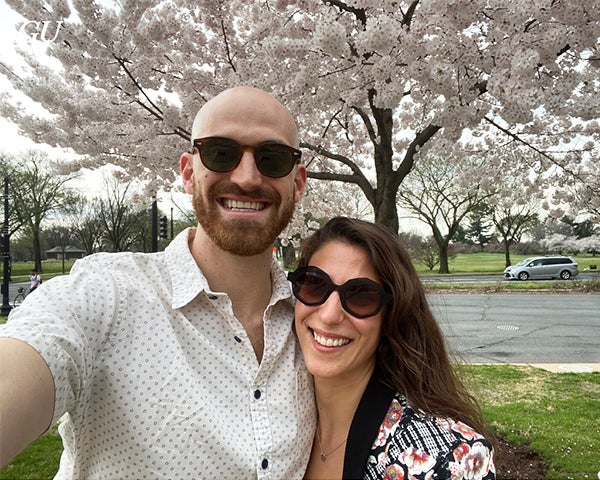
“I was in the emergency department when the first case was diagnosed at Georgetown, so I felt like I was really experiencing the evolution of the pandemic coming to the DC area in real time. You could feel the environment changing — with each shift there were more and more changes to the workflow,” Meninno said.
For her family medicine residency, Meninno is headed to New York Presbyterian/Columbia University Medical Center in New York City. With widely publicized concerns about overburdened health systems in New York City and a scarcity of personal protective equipment (PPE) for medical professionals, Meninno said she is ready to enter the fray.
“Overall I am really eager to start this new chapter,” Meninno said. “Ultimately, this is why we all chose medicine in the first place. Coronavirus is something new for us, and poses unique challenges, but there are patients in need of care and that’s what medicine is all about.”
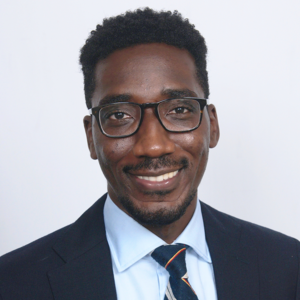
Oswald Reid Jr. (M’20) is also headed to New York City, where he will soon start his residency in emergency medicine at Mount Sinai Hospital. Originally from New York City, and having taught high school in Brooklyn prior to starting medical school at age 30, Reid is ready to be on the front lines in the city that feels like home for him.
“I’m excited to go, and especially in a city that means so much to me. It’s even more powerful for me to go back there and help as best as I can in a specialty that is at the front line of caring for patients with COVID-19,” Reid said. “Part of what drove me into emergency medicine in the first place is that I deal well with the unexpected. I think it’s all about how we respond to this.”
Stephen Ray Mitchell, MD, MBA, MACP, FRCP, dean for medical education, expressed his appreciation for the daunting path that faces the Class of 2020.
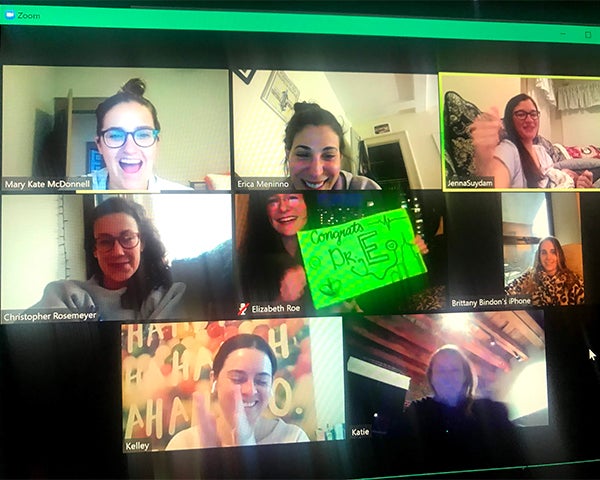
“This is a powerfully compelling moment — they’re walking into a maelstrom. At some point in the practice of medicine you may end up taking care of the deathly ill patient who is depending on you completely, and this is what you train for. But for these young people, they’re walking into that right away,” Mitchell said.
While noting he is confident this class is resilient and will rise to the challenge, he cautioned “that can come at some cost” in terms of physician burnout and other challenges.
“An important part of becoming resilient is admitting our vulnerabilities. It’s not about just being tough and not blinking because everyone is feeling the burn. I want these students to know they are not alone in this — we’re all vulnerable to this challenge.”
While these graduates will need to lean heavily on their hard-earned clinical skills in their next chapter, they also expect to draw on other facets of Georgetown.
Reid said Georgetown’s emphasis on patient advocacy, public health and care for underserved communities, which enabled him to volunteer at Georgetown’s student-run HOYA Clinic and serve as a health justice scholar, have left a lasting impression.
“I can see now what we as physicians can do and need to do to help address the needs of vulnerable populations. I do feel like I am armed with the necessary skills to not only address COVID-19, but also to help more vulnerable patients once I get to New York City in this unprecedented time,” Reid said.
Meninno said she is grateful for Georgetown’s longstanding tradition of cura personalis, or care of the whole person.
“There has been ample opportunity to not only gain a strong clinical foundation moving into residency, but also to really grapple with the social and political factors that influence people’s health and us as professionals in terms of our delivery of care. I’m really grateful that this has been such a large component of my medical training.”
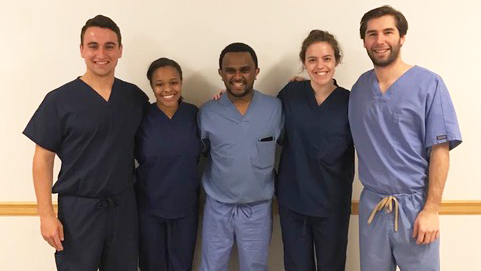
Mitchell said he feels that part of this graduating class’s resiliency is that they are an extremely close knit group.
“I remind them that they are very good and very strong, but that they should not lose that connection because ultimately that will get them through this. They have their families and other points of support, but they must not forget one another because they share this unique experience that they can’t convey to anyone else,” he said.
Despite the social distancing of the last few months and the fact that this class did not have a chance to bid their farewells in person, the students said their bonds are stronger than ever.
“We have a class Facebook page where we are constantly posting group messages, we do Zoom meetings, and generally just stay very connected. I think there is a sense — particularly because we can’t have a physical graduation ceremony, that we need to gather virtually, just to celebrate our accomplishments together before we all head off for our residencies,” Rucker said.
Lauren Wolkoff (G’13)
GUMC Communications